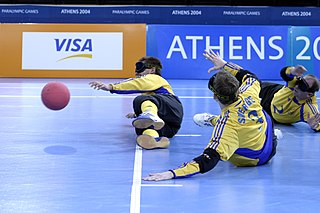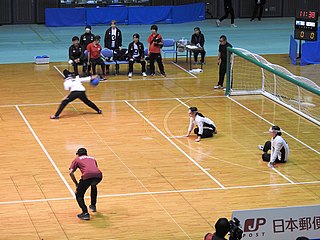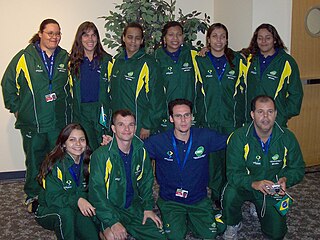Paralympic football consists of adaptations of the sport of association football for athletes with a physical disability. These sports are typically played using International Federation of Association Football (FIFA) rules, with modifications to the field of play, equipment, numbers of players, and other rules as required to make the game suitable for the athletes

Goalball is a team sport designed specifically for athletes with a vision impairment. Participants compete in teams of three, and try to throw a ball that has bells embedded in it into the opponents' goal. The ball is thrown by hand and never kicked. Using ear-hand coordination, originating as a rehabilitation exercise, the sport has no able-bodied equivalent. Able-bodied athletes are also blindfolded when playing this sport.
The International Blind Sports Federation (IBSA) is a non-profit organisation founded 1981 in Paris, France. It was formerly known as the International Blind Sports Association. IBSA's mission is to promote the full integration of blind and partially-sighted people in society through sport and to encourage people with a visual impairment to take up and practise sports. IBSA is a full and founding member of the International Paralympic Committee (IPC).
Blind Sports Australia, formerly the Australian Blind Sports Federation (ABSF) was formed in 1980 as the national body to coordinate sport for the blind and vision-impaired in Australia. It encourages and provides access to international competition in world blind and multi-disabled championships for sports recognised by the International Blind Sports Federation (IBSA) and the International Paralympic Committee (IPC). BSA is headquartered near Melbourne.

Ulrich Pfisterer is a former German football player and coach. Since 2007 he is Head Coach of Blind Football Team Germany and of MTV Stuttgart.

B1 is a medical-based Paralympic classification for blind sport. Athletes in this classification are totally or almost totally blind. It is used by a number of blind sports including blind tennis, para-alpine skiing, para-Nordic skiing, blind cricket, blind golf, five-a-side football, goalball and judo. Some other sports, including adaptive rowing, athletics and swimming, have equivalents to this class.

B2 is a medical based Paralympic classification for blind sport. Competitors in this classification have vision that falls between the B1 and B3 classes. The International Blind Sports Federation (IBSA) defines this classification as "visual acuity ranging from LogMAR 1.50 to 2.60 (inclusive) and/or visual field constricted to a diameter of less than 10 degrees." It is used by a number of blind sports including para-alpine skiing, para-Nordic skiing, blind cricket, blind golf, five-a-side football, goalball and judo. Some sports, including adaptive rowing, athletics and swimming, have equivalents to this class.

B3 is a medical based Paralympic classification for blind sport. Competitors in this classification have partial sight, with visual acuity from 2/60 to 6/60. It is used by a number of blind sports including para-alpine skiing, para-Nordic skiing, blind cricket, blind golf, five-a-side football, goalball and judo. Some other sports, including adaptive rowing, athletics and swimming, have equivalents to this class.

Japan women's national goalball team is the women's national team of Japan. Goalball is a team sport designed specifically for athletes with a vision impairment. Its women's team has internationally completed including at the IBSA World Goalball Championships and the Paralympic Games.

Brazil women's national goalball team is the women's national team of Brazil. Goalball is a team sport designed specifically for athletes with a vision impairment. The team takes part in international goalball competitions.

Russia women's national goalball team is the women's national team of Russia. It takes part in international goalball competitions. Goalball is a team sport designed specifically for athletes with a vision impairment.

Blind Football is variation of futsal designed for players who are blind or visually impaired. It is currently a Paralympic sport, and the International Blind Sports Association (IBSA) also organizes a World Championship.
The IBSA European Judo Championships is an event organized by the International Blind Sports Federation (IBSA). It is a judo competition for visually impaired athletes. Organised biennially, the competition is not run during years when the IBSA World Judo Championships or Summer Paralympics are contested.
Blind football in Cameroon is a sport played by people with vision impairments in Cameroon. The sport is currently in the development stage, with various activities supporting these efforts. A national competition for the sport took place in September 2016.
Blind sports in Cameoon include goalball, torball, athletics, African wrestling, judo and 5-a-side football. Blind sports first began in the 2000s, with Cameroon participating in national and international competitions, and hosting workshops. In 2010, a new law was passed to try to increase enforcement of making buildings handicap accessible.
The IBSA World Games or World Blind Games are an international multi-sport event, occurring every four years, organized by the International Blind Sports Federation (IBSA). The events enable blind and partially sighted athletes to compete in a number of sports. The first event took place at Madrid, Spain in 1998.
The World Blind Football Championships, formerly the Football-5-a-Side World Championships, were played for the first time in 1998.

Goalball at the 2020 Summer Paralympics was held in the Makuhari Messe in Tokyo. The event was held from 25 August to 3 September 2021.

Football 5-a-side at the 2020 Summer Paralympics was held at the Aomi Urban Sports Venue in Tokyo.
Algerian men's national goalball team is the men's national team of Algeria. Goalball is a team sport designed specifically for athletes with a vision impairment. The team takes part in international goalball competitions.










